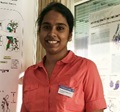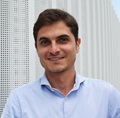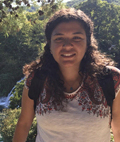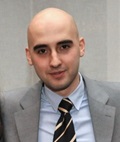 Christin Pohl - ESR 1
Christin Pohl - ESR 1
Project: “
Characterization of protein solution structure using light scattering techniques and SAXS”
Host:
Novozymes A/S, Denmark
Main supervisor: Allan Nørgaard, Novozymes.
I did my masters in biochemistry at the University of Düsseldorf, Germany with the focus on biophysics and structural analysis of proteins. My master thesis in the Forschungszentrum Jülich focused on the protein structure of the infectious prion protein using solid-state NMR.
I joined the PIPPI project in April 2017as a PhD student in Novozymes, Denmark. My project focuses on the stability and solution structure of single domain protein drugs using Small-Angle X-Ray Scattering (SAXS). The studies will be supported by complementary techniques such as dynamic light scattering (DLS), analytical ultracentrifugation (AUC) and thermal- and chemical denaturation studies.
 Sowmya Indrakumar - ESR 2
Sowmya Indrakumar - ESR 2
Project: Characterization of protein-excipient interactions on the molecular level using in-silico simulation techniques.
Host: Department of Chemistry, Technical University of Denmark
Main supervisor: Günther H. J. Peters
After completing my Bachelor of Science (Research ) degree with major subject as biology and minor in Mathematics, I continued to pursue Master’s degree in Biology from Indian Institute of science, Bangalore. I was a recipient of INSPIRE-DST fellowship throughout my under-graduate studies.
My PhD research focuses on the determination of protein-excipients interaction sites (‘hot spots’) at different physicochemical conditions such as pH and ionic strength using computer simulation techniques. For instance, bioinformatics tools, molecular docking and molecular dynamics simulations will be used to study the effect of excipients on protein stability and to identify excipient hot spot regions on proteins and protein-protein complexes with the aim to correlate these results with experimentally determined structural and stability data generated in the consortium.
 Sujata Mahapatra - ESR 3
Sujata Mahapatra - ESR 3
Project: Detailed characterization of weak and strong protein-protein interactions and the structure in more concentrated solutions
Host: Novozymes A/S
Main supervisor: Werner W. Streicher
I did my Bachelor and Master of Science in Chemistry at National Institute of Technology, in India. In my Ph.D., I will work on the molecular basis for protein-protein interactions from measurements of static structure factors for proteins that are available at high protein concentrations. I will purify proteins and do the necessary characterization of protein behavior in different pH and ionic strength followed by Small-Angle X-ray Scattering studies for determining the structure factor and thereby the nature of the intermolecular interactions. The experiments will be supplemented by in-silico modeling to elucidate the nature of protein-protein interactions in concentrated solution structure. The primary goal of my research is to determine the intermolecular solution structure of proteins for determining the formulation attributes.
 Stefan Hervo Hansen – ESR 4
Stefan Hervo Hansen – ESR 4
Project: “Modelling of proteins for characterizing structure dependent on physiochemical factors”
Host: Lund University, Sweden
Main supervisor: Associate professor Mikael Lund, Lund University.
After finishing my Bachelor of Science in experimental biochemistry, I continued pursuing a Master of Science in biochemistry with specialization in protein chemistry with my master’s
project in the field of biophysics with specialty in molecular dynamics of pH effects on biomolecules.
In my Ph.D. our primary goal is the study of protein stability and solubility in formulation in silico. In order of doing so, we seek to develop methods and investigate underlying principles of protein stability and solubility by Monte Carlo simulation and molecular dynamics at various degrees of course graining and the dependency of various physicochemical factors including pH and specific effects.
 Matja Zalar – ESR 5
Matja Zalar – ESR 5
Project: “Experimental characterization of protein-excipient interactions and impact on protein conformation and aggregation using NMR spectroscopy”
Host: University of Manchester, United Kingdom
Main supervisor: Dr. Alexander Golovanov, University of Manchester.
Matja joined PIPPI in June 2016 as Early Stage Researcher 5. She works on a project focused on studying protein-excipient interactions and their impact on protein aggregation using NMR spectroscopy. We are developing quantitative NMR screens for identifying protein-excipient interactions, especially for weakly binding excipients. We are also applying NMR techniques to assess protein-protein interactions that may precede aggregation. We will combine the two aspects to identify excipients that improve protein stability. These results will be complemented with experimental screening data and MD simulations in collaboration with other ESRs. Before joining the PIPPI project, Matja studied Biochemistry at University of Ljubljana, Slovenia and graduated with a master thesis on structural and dynamical properties of G-quadruplex forming nucleic acids using NMR spectroscopy.
 Andreas Tosstorff - ESR 6:
Andreas Tosstorff - ESR 6:
Project: Rational design of aggregation breaking excipients (LMU)
Host: Ludwig-Maximilians-Universität München, Germany
Main supervisor: Professor Gerhard Winter, Ludwig-Maximilians-Universitaet Munchen.
We are developing a systematic, computational approach to find non-toxic molecules that bind to aggregation hotspots of therapeutic proteins and test their potential to inhibit protein aggregation. The discovered molecules are expected to reduce protein aggregation without jeopardizing the drug product's efficacy and safety.
 Maria Laura Greco - ESR 7:
Maria Laura Greco - ESR 7:
Project title: Effects of excipients on protein behaviour in dilute to concentrated solutions (MEDI)
Host: MedImmune Inc., United Kingdom
Main supervisor: Shahid Uddin, MedImmune.
After receiving her combined BSc ans MSc degree in “Pharmaceutical chemistry and technologies” at the University of Siena, Maria Laura obtained an additional II level master in “Clinical pharmacy” from the University of Milan, Cagliari and Granada. She is also registered at the Pharmacist Society in Italy. Currently she is a candidate PhD student at the University of Manchester, but mainly based in MedImmune (Cambridge, UK) whithin the Formulation team. The research project is focused on the elucidation of the molecular mechanisms responsible of non specific protein protein interactions (nsPPIs) through orthogonal methods: DLS, SLS, SAXS and AUC. In addition, from the development of a novel method for characterizing kD based on Taylor dispersion analysis (TDA) the analyse of solutions containing concentrated excipients will be possible. Final aim, is to develop models for elucidating how nsPPIs depend on excipients and solvent conditions.
 Lorenzo Gentiluomo - ESR 8:
Lorenzo Gentiluomo - ESR 8:
Project: “Aggregation kinetics”
Host: Wyatt Technology, Germany
Main supervisor: Dr. Dierk Roessner, Wyatt Technology.
Lorenzo Gentiluomo was born in 1991, studied Chemistry at La Sapienza Univerisity of Rome. During his studies he worked as Formulation Scientist at Henkel and as young Scientist at the University of Jyväskylä. He finished his Master in Organic and Bimolecular chemistry in 2016 with a thesis in Crystal engineering. In 2016 he joined the PIPPI project as PhD studentunder the supervision of Prof. Dr. Frieß at Wyatt Technology Europe.The aim of his project is to develop novel methods, with a focus on light scattering and separation techniques, for assessing aggregation propensity and kinetics of pharmaceutical proteins.
 Aisling Roche - ESR 9:
Aisling Roche - ESR 9:
Project: “Concentrated Solution Rheology”
Host: University of Manchester
Main supervisor: Robin Curtis, University of Manchester.
Aisling is an Irish student currently carrying out her PhD research at University of Manchester, UK. Aisling studied Chemical and Bioprocessing Engineering at University College Dublin, before embarking on the PIPPI project in August 2016. Her project 'ESR 9: Concentrated Solution Rheology' focuses on using multiple rheology and light scattering techniques to assess the viscosity of protein solutions and the role of protein-protein interactions in the increase in viscosity of some protein solutions at high concentrations.

Inas El-Bialy - ESR 10
Project: “Interfacial aggregation kinetic”
Host: Ludwig-Maximilians-Universität München, Germany
Main supervisor: Professor Dr. Wolfgang Frieß, Ludwig-Maximilians-Universität München.
The current PhD project aims at developing an understanding of the role of protein structure, physicochemical properties and formulation characteristics on the aggregate formation as a consequence of exposure of proteins to the air - liquid and packaging material – liquid interface. Aggregation at the interface involves multiple pathways with protein adsorption, dynamic change of the interface by compression and decompression, displacement of protein film from the interface into the bulk and aggregate formation depending on structural change of the protein and protein-protein interaction. Consequently, the protein behaviour at the interface of a series of protein molecules and formulations will be tested which includes fluorescence based methods at the interface, Langmuir-trough-measurements, automated repeatedly cycling Langmuir trough, Langmuir-Schäfer transfer and FTIR-microscopy. Predictive models will be developed which integrate knowledge of all individual steps in the aggregation pathway, unfolding, crowding and stress at the interface as well as protein-protein interactions at the interface and in the bulk.
 Dillen Augustijn - ESR 11:
Dillen Augustijn - ESR 11:
Project title: Multivariate data analysis in protein design (UCPH)
Host: University of Copenhagen
Main supervisor: Associate professor Åsmund Rinnan, University of Copenhagen.
I’m a Dutch chemometrician and Analytical Scientist educated at the Radboud University Nijmegen. During my education I worked with autofluorescence flow cytometry data of algae. In another project I measured and modelled MALDI-TOF-MS data of polymers. During my master degree I received a COAST MSc+ grant which included over 200 hours of additional teaching in analytical chemistry at various Dutch universities and institutions. Since August 2016 I have been employed at the UCPH. Under supervision of dr. Åsmund Rinnan I will handle the collection, storage and modelling of the data generated within PIPPI.
The first part of my project focuses on gathering the information, standardizing the data input, and storing it. As PIPPI will produce many data, it is vital for the outcome of the project to analyze these data from a multivariate perspective. The main part of my research will therefore be in the field of chemometrics, which is the multivariate data analysis for chemical data. Relational Database Design and Management are a large part of the project and interfacing these with chemometric applications will be one of my aims. I am very much looking forward to collaborating with my fellow ESRs and the companies involved. I personally believe the questions the PIPPI project will answer are very interesting and will aid the development of more stable, safer, and more efficacious medicines.
 Marco Polimeni – ESR 12
Marco Polimeni – ESR 12
Project: “Electrostatic Feature Extraction using Statistical Thermodynamic“
Host: Lund University, Sweden
Main supervisor: Associate professor Mikael Lund, Lund University.
Marco is an italian physicist who did his Bachelor degree at the University of Messina and continued
his studies at University of Rome "Tor Vergata". During his master thesis work, performed in part in
collaboration with the Oak Ridge National Laboratory (ORNL) in USA, he acquired many
computational skills performing molecular dynamics (MD) simulations
and applying density functional theory (DFT) to study interactions between small proteins and inorganic surfaces.
Currently Marco is a PhD student at the division of Theoretical Chemistry in Lund University. In the framework of PIPPI project, his goal is developing theoretical models that can
predict protein-protein interactions in solution. These models, further improved by the comparison with experimental results, will provide useful information in the protein-drugs
formulation.
 Hristo Svilenov - ESR 13:
Hristo Svilenov - ESR 13:
Project title: Protein folding stability and storage stability
Host: Ludwig-Maximilians-Universität München
Main supervisor: Professor Gerhard Winter
Hristo Svilenov joined PIPPI in June 2016 as Early Stage Researcher 13. He works on a project focused on the prediction of long-term protein stability.
Briefly, we will use various stability indicating methods (e.g. DSF, chemical denaturation, DLS, SLS) to study how different excipients and formulation conditions affect protein stability. Next, the prediction quality of the different methods will be evaluated by comparison with the outcome of long-term (real-time) stability studies for as much proteins as possible. Finally, we will try to determine general rules when predictivity is high and when it is low. Recommendations for a rationale use of such predictive methods shall conclude the project.
Before joining PIPPI Hristo studied Pharmacy from 2016 to 2012 at the Medical University – Sofia, Bulgaria, where he also worked as Assistant after his graduation. In 2015 Hristo joined Bioskinco GmbH and worked on a project related to cryopreservation and freeze-drying of human cells.
 Hristo Svilenov - ESR 13:
Hristo Svilenov - ESR 13:
Project: "Protein folding stability and storage stability"
Host: Ludwig-Maximilians-Universität München
Main supervisor: Professor Gerhard Winter
Hristo Svilenov joined PIPPI in June 2016 as Early Stage Researcher 13. He works on a project focused on the prediction of long-term protein stability.
Briefly, we will use various stability indicating methods (e.g. DSF, chemical denaturation, DLS, SLS) to study how different excipients and formulation conditions affect protein stability. Next, the prediction quality of the different methods will be evaluated by comparison with the outcome of long-term (real-time) stability studies for as much proteins as possible. Finally, we will try to determine general rules when predictivity is high and when it is low. Recommendations for a rationale use of such predictive methods shall conclude the project.
Before joining PIPPI Hristo studied Pharmacy from 2016 to 2012 at the Medical University – Sofia, Bulgaria, where he also worked as Assistant after his graduation. In 2015 Hristo joined Bioskinco GmbH and worked on a project related to cryopreservation and freeze-drying of human cells.
 Marcello Martinez Morales - ESR 14
Marcello Martinez Morales - ESR 14
Project: “Characterizing the effect of macrocyclic excipients on protein-protein interactions and solution behaviour”
Host: MedImmune Inc, United Kingdom
Main supervisor: Christopher F. van der Walle, MedImmune
Marcello holds a degree in Pharmacy from Ludwig-Maximilians-Universität München and in Pharmaceutical Technology from Universität des Saarlandes. Prior to his appointment at MedImmune, he was a research scholar at the University of Southern California where he worked on the biophysical characterization of elastin-like polypeptide nanoparticles. In his PhD project, Marcello investigates the effect of macrocyclic molecules on protein-protein interactions and protein solution behaviour. In particular, how addition of macrocycles can aid in mitigating protein aggregation propensity.

Alina Kulakova - ESR 15:
Project: Characterization of solution structure of multi-domain proteins and protein complexes (DTU)
Host: Department of Chemistry, Technical University of Denmark
Main supervisor: Associate professor Pernille Harris, Technical University of Denmark
I had completed my bachelor in Biochemistry and my master in Biochemistry for Health at New University of Lisbon in Portugal. My master thesis consisted in membrane protein production and purification, complemented by crystallization, data collection and structural modelling of several variants of thiosulfate dehydrogenase.
My PhD project will be focused on structural characterization of multi-domain proteins and protein complexes using primarily Small Angle X-ray Scattering (SAXS) complemented with X-ray crystallography and in-silico modelling tools, that will provide information about protein-protein and protein-excipient interactions. Protein purification and biochemical characterization will be performed in Novozymes A/S, SAXS data collection and analysis in MAXIV and in silico modelling in University of Copenhagen.
 Hristo Svilenov - ESR 13:
Hristo Svilenov - ESR 13:
Project title: Protein folding stability and storage stability
Host: Ludwig-Maximilians-Universität München
Main supervisor: Professor Gerhard Winter
Hristo Svilenov joined PIPPI in June 2016 as Early Stage Researcher 13. He works on a project focused on the prediction of long-term protein stability.
Briefly, we will use various stability indicating methods (e.g. DSF, chemical denaturation, DLS, SLS) to study how different excipients and formulation conditions affect protein stability. Next, the prediction quality of the different methods will be evaluated by comparison with the outcome of long-term (real-time) stability studies for as much proteins as possible. Finally, we will try to determine general rules when predictivity is high and when it is low. Recommendations for a rationale use of such predictive methods shall conclude the project.
Before joining PIPPI Hristo studied Pharmacy from 2016 to 2012 at the Medical University – Sofia, Bulgaria, where he also worked as Assistant after his graduation. In 2015 Hristo joined Bioskinco GmbH and worked on a project related to cryopreservation and freeze-drying of human cells.
 Hristo Svilenov - ESR 13:
Hristo Svilenov - ESR 13:
Project title: Protein folding stability and storage stability
Host: Ludwig-Maximilians-Universität München
Main supervisor: Professor Gerhard Winter
Hristo Svilenov joined PIPPI in June 2016 as Early Stage Researcher 13. He works on a project focused on the prediction of long-term protein stability.
Briefly, we will use various stability indicating methods (e.g. DSF, chemical denaturation, DLS, SLS) to study how different excipients and formulation conditions affect protein stability. Next, the prediction quality of the different methods will be evaluated by comparison with the outcome of long-term (real-time) stability studies for as much proteins as possible. Finally, we will try to determine general rules when predictivity is high and when it is low. Recommendations for a rationale use of such predictive methods shall conclude the project.
Before joining PIPPI Hristo studied Pharmacy from 2016 to 2012 at the Medical University – Sofia, Bulgaria, where he also worked as Assistant after his graduation. In 2015 Hristo joined Bioskinco GmbH and worked on a project related to cryopreservation and freeze-drying of human cells.
 Hristo Svilenov - ESR 13:
Hristo Svilenov - ESR 13:
Project title: Protein folding stability and storage stability
Host: Ludwig-Maximilians-Universität München
Main supervisor: Professor Gerhard Winter
Hristo Svilenov joined PIPPI in June 2016 as Early Stage Researcher 13. He works on a project focused on the prediction of long-term protein stability.
Briefly, we will use various stability indicating methods (e.g. DSF, chemical denaturation, DLS, SLS) to study how different excipients and formulation conditions affect protein stability. Next, the prediction quality of the different methods will be evaluated by comparison with the outcome of long-term (real-time) stability studies for as much proteins as possible. Finally, we will try to determine general rules when predictivity is high and when it is low. Recommendations for a rationale use of such predictive methods shall conclude the project.
Before joining PIPPI Hristo studied Pharmacy from 2016 to 2012 at the Medical University – Sofia, Bulgaria, where he also worked as Assistant after his graduation. In 2015 Hristo joined Bioskinco GmbH and worked on a project related to cryopreservation and freeze-drying of human cells.
 Hristo Svilenov - ESR 13:
Hristo Svilenov - ESR 13:
Project title: Protein folding stability and storage stability
Host: Ludwig-Maximilians-Universität München
Main supervisor: Professor Gerhard Winter
Hristo Svilenov joined PIPPI in June 2016 as Early Stage Researcher 13. He works on a project focused on the prediction of long-term protein stability.
Briefly, we will use various stability indicating methods (e.g. DSF, chemical denaturation, DLS, SLS) to study how different excipients and formulation conditions affect protein stability. Next, the prediction quality of the different methods will be evaluated by comparison with the outcome of long-term (real-time) stability studies for as much proteins as possible. Finally, we will try to determine general rules when predictivity is high and when it is low. Recommendations for a rationale use of such predictive methods shall conclude the project.
Before joining PIPPI Hristo studied Pharmacy from 2016 to 2012 at the Medical University – Sofia, Bulgaria, where he also worked as Assistant after his graduation. In 2015 Hristo joined Bioskinco GmbH and worked on a project related to cryopreservation and freeze-drying of human cells.
 Hristo Svilenov - ESR 13:
Hristo Svilenov - ESR 13:
Project title: Protein folding stability and storage stability
Host: Ludwig-Maximilians-Universität München
Main supervisor: Professor Gerhard Winter
Hristo Svilenov joined PIPPI in June 2016 as Early Stage Researcher 13. He works on a project focused on the prediction of long-term protein stability.
Briefly, we will use various stability indicating methods (e.g. DSF, chemical denaturation, DLS, SLS) to study how different excipients and formulation conditions affect protein stability. Next, the prediction quality of the different methods will be evaluated by comparison with the outcome of long-term (real-time) stability studies for as much proteins as possible. Finally, we will try to determine general rules when predictivity is high and when it is low. Recommendations for a rationale use of such predictive methods shall conclude the project.
Before joining PIPPI Hristo studied Pharmacy from 2016 to 2012 at the Medical University – Sofia, Bulgaria, where he also worked as Assistant after his graduation. In 2015 Hristo joined Bioskinco GmbH and worked on a project related to cryopreservation and freeze-drying of human cells.